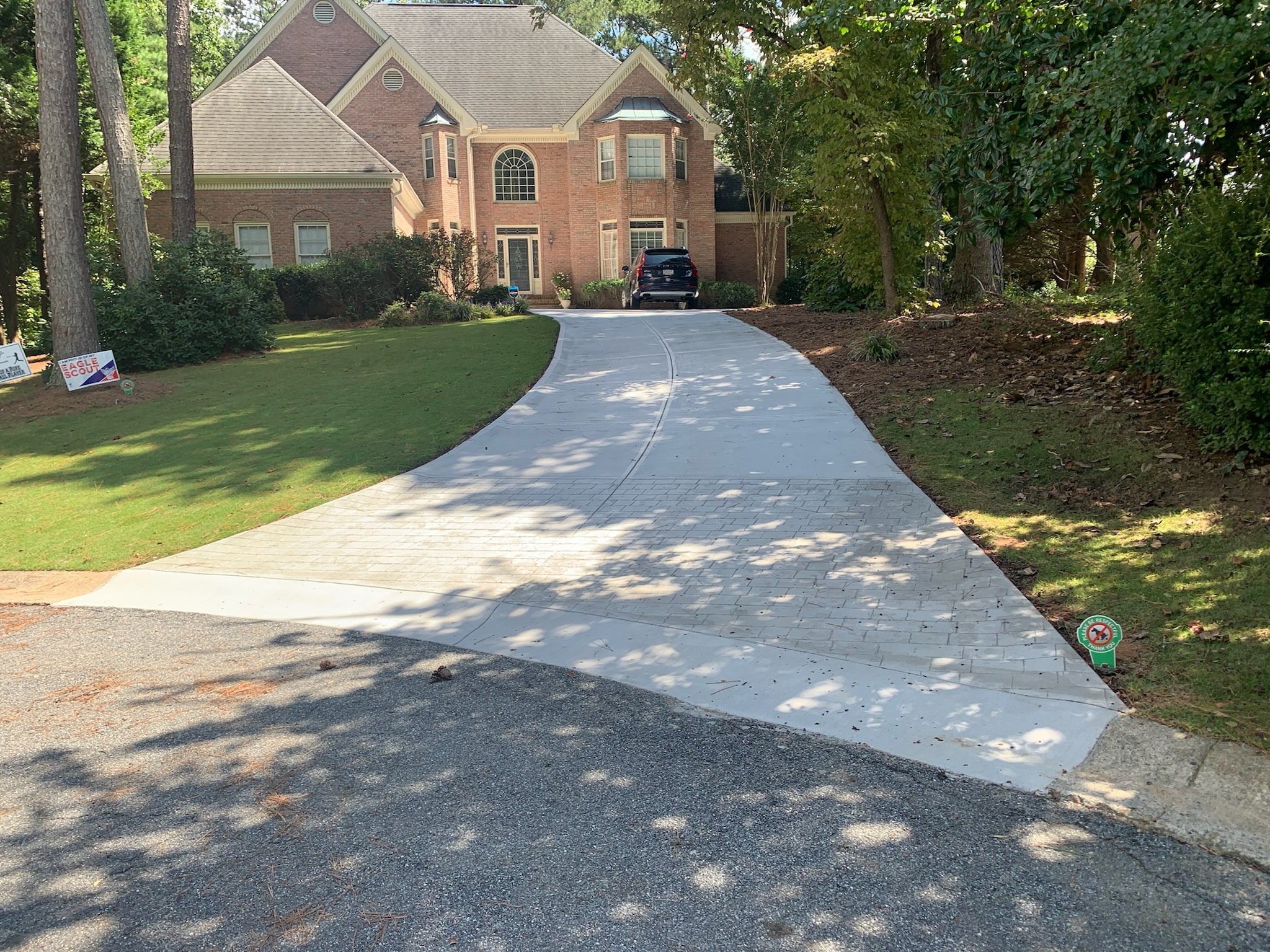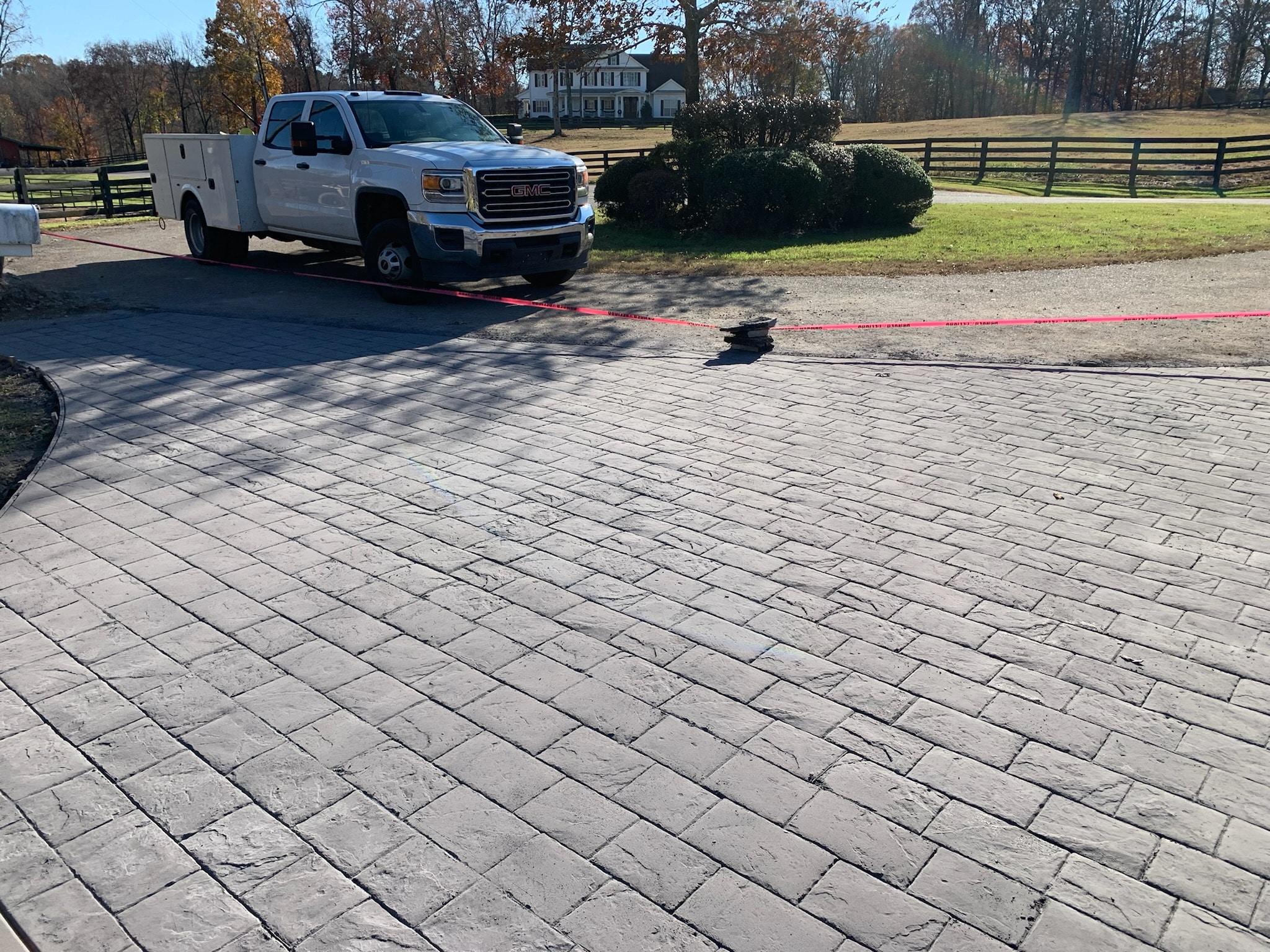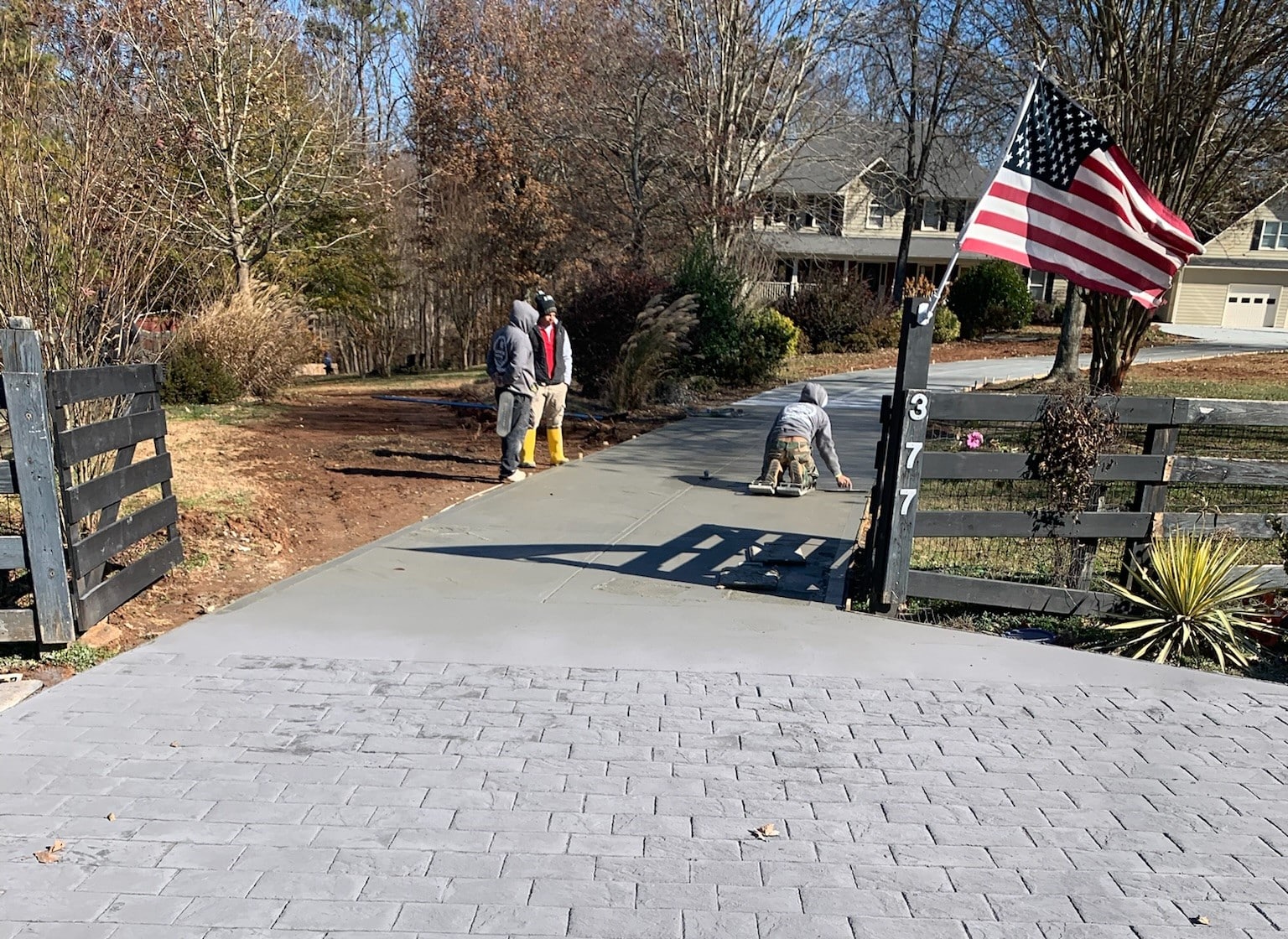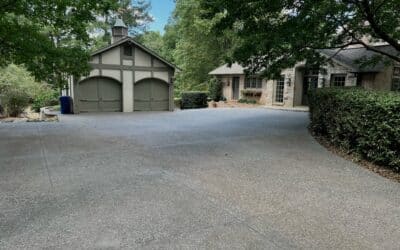When it comes to curb appeal, your driveway plays a big part in enhancing the overall aesthetic of your home. But even with a spectacular driveway, the lack of a proper driveway apron can disrupt your home’s curb appeal.
So, what is a driveway apron? What is its purpose besides improving the look of your home? And exactly why and when do you need one? The following guide answers these questions to help you learn more about driveway aprons.
What is a Driveway Apron?

Also known as a driveway approach, a driveway apron connects your driveway to the road by creating a sloped opening in the curb. This makes it a seamless part of your driveway. If your driveway is connected to a sidewalk, the paved area between your sidewalk and the road serves as your driveway apron.
To think of it simply, your driveway apron is the outer end of your driveway that connects you to either your sidewalk or your street. Your driveway apron can also be developed with the same material as your driveway to create a seamless appearance or with different materials to make it a distinct part of your curbside architecture.
What is the Purpose of a Driveway Apron?
A driveway apron serves multiple purposes, but its main benefit is creating an opening in the curb that makes it easier and safer for your car to travel through your driveway. This prevents your vehicle from hitting the curb, while making it possible for you to smoothly drive it over sidewalks and into your driveway.
A driveway apron also ensures proper drainage across your driveway. This enables you to remain free of excessive standing water and saves your home from flooding. It also prevents cracks and erosion that can occur from standing water.
But that’s not all: Many homeowners prefer having a driveway apron because it adds to the aesthetic of their homes. When your driveway apron is designed by experienced professionals, you can rest assured that it improves the curb appeal of your home.
Why Do You Need a Driveway Apron?

Your driveway apron offers a wide array of benefits, including but not limited to the following perks.
- Easier entry and exit. With the smooth entryway of a driveway apron, you can easily drive your vehicles in and out of your driveway without feeling any bumps from the curb.
- It minimizes accidents. By creating an entryway through the curb, your vehicles do not hit the curb when you drive them through your driveway. This can save you from out-of-pocket car repair costs and insurance claims.
- It ensures proper drainage. The sloped design of driveway apron also leads rainwater or excess water down your driveway and towards the storm drainage system of your street.
- It enhances curb appeal. When your driveway apron is designed and developed by professionals, it can effortlessly complement the appearance of your driveway and improves the curb appeal of your home.
- It complements structural elements. While rural areas typically don’t need driveway aprons, the structural design of urban neighborhoods often makes drive aprons necessary for homeowners.
It’s not necessary for every homeowner to have a driveway apron. For example, if you live in a rural area, you may not need a driveway apron to begin with. But for most urban neighborhoods, driveway aprons remain essential. This is one of the reasons why the repair and reconstruction of driveway aprons is often overseen by local authorities like municipalities or homeowners associations (HOAs).
How Do You Make Changes to a Driveway Apron?

If you live in an urban area, there are high chances that your home already has a driveway apron. But if your driveway apron breaks down due to use or weather damage, you may want to repair or replace it as soon as possible. Before you do that, you might need to get special approvals or permits from local authorities like your municipality or HOA.
Note that your driveway apron is unlike other construction projects that are solely performed over your own property. Instead, your driveway apron rests over public property that is owned by your city or municipality.
Here’s how it works.
Your driveway apron is laid across the area that connects the sidewalk to the road. This area is known as a “road verge” among many other interesting names. In some cases, your driveway apron may also overlap the sidewalk to directly connect with your driveway. Both the road verge and the sidewalk do not fall under your ownership. Instead, they remain the property of local authorities. This makes it necessary to get permits from these authorities prior to making any changes to your driveway apron.
However, the requirement to get approvals goes beyond who owns the area of driveway aprons.Some driveway aprons typically sit atop the street’s underground sanitary and water lines, while their slope and structure plays a significant role in the storm drainage system of your street. If you make any unauthorized changes to the site of your driveway apron, it can get in the way of proper sewage and drainage, while increasing the risk of flooding. With that, temporarily blocking the pavement for constructional work can cause disturbances to public right-of-way.
Due to this reason, any changes that you make to your driveway apron can directly impact the sidewalk or road verge. At the very least, for the duration of your driveway apron project, you can potentially obstruct the way for people to pass through the street, while also possibly affecting public property like underground water lines, sewage lines, and drainage systems that rest under the sidewalk or road verge. To make sure that your driveway apron changes or improvements do not disturb others without notice and do not heighten the risk of flooding the street, you often need to take proper permits for this construction project.
That is why, the first step for making changes to your driveway apron is coordinating with local authorities like municipalities and HOAs to make any changes to your driveway apron. For example, installing, modifying, or repairing your driveway apron in Atlanta, GA requires you to obtain applicable permits from the Department of Transportation.
As such, it is important to work to obtain the necessary approvals from local authorities prior to proceeding on your driveway apron project.
What Type of Driveway Apron Options Are Available?
Here are a few aspects to consider when it comes to your driveway apron projects.
Materials
Due to a wide variety of factors, including the regulations of your municipality or HOA, your new driveway apron will typically have the same material as your driveway. With that being said, you may have the ability to use different materials and designs to achieve a distinct look for your home and improve its curb appeal.
Some of the most popular material choices for a driveway apron include concrete and asphalt. However, you can also go the aesthetic route and use cobblestone or natural stone. Typically, adding a contrasting material can complement the overall design of the entrance and create a stunning aesthetic.
However, you need to check local regulations for the types of material you can use in your driveway apron. In some areas, using different materials can negatively affect the functionality of your driveway apron by increasing the likelihood of cracks or reduced traction.
Dimensions
Typically, your driveway apron can be 8-15 feet long, starting from the road to the point where it meets your driveway. But if your driveway is connected to the sidewalk, your driveway apron stops right where it connects with the sidewalk.
As for the width of your driveway apron: It is typically the same size as your driveway. It is essential to note that the average thickness is about 4-5 inches to ensure optimal durability.
Once again, the dimensions that you can choose largely depend on the regulations of your community. This once again calls for you to check with local authorities to avoid potential compliance issues.
Construction Details
While constructing a new driveway apron or improving an existing one, you may also need to be wary of minute details like the curb cut, apron thickness, and use of steel reinforcement. This can often make or break the look and function of your driveway, which is why these choices are heavily regulated by housing authorities.
This turns the process of creating or repairing your driveway apron into a tricky task. But with the help of professionals who specialize in driveway aprons, you can breeze through all the steps of creating the perfect driveway approach for your home.
Consider Damage and Maintenance
t might be no surprise to learn that, like other outdoor structures, driveway aprons can be easily damaged. In addition to constant sunlight, your driveway apron material can also be affected by heavy foot traffic or vehicle movements.
It’s important to be aware of some common issues that can damage the driveway apron. Neglecting these issues can lead to costly repairs, which is why addressing them is crucial.
- Cracking
- Sinking
- Discoloration
- Erosion/Surface Deterioration
To extend the longevity of your driveway apron, it is important that you attend to these issues before it turns to extensive damage. Remember: minor repairs are easy to do and quickly fix the issue, but if extensive damage compromises the structural integrity of your driveway apron, you might need to replace it entirely.
Who Can Construct a New Driveway Apron?
While it’s easy to learn why you need a driveway apron and the different choices you can make for its construction or improvement, creating a new driveway apron requires proper planning, effort, and implementation. You need to go beyond learning what a driveway apron is: You not only need an overview of local regulations, but also have to understand the meticulous process of creating these structures.
That is where concrete application experts come into the picture. If your municipality or HOA prefers to handle driveway aprons themselves, they may have city workers or hire third-party contractors to carry out this work. In case they want the work to be done by specific professionals, they might refer you to certain contractors. In situations where you are allowed to make these changes yourself, you can directly hire these professionals.
Besides new driveway apron constructions, concrete application experts can also help you with repairs or improvements for your existing driveway apron. This can help you harmonize your home’s driveway and improve its curb appeal while staying within the regulations laid out by your local authorities.
When installing a driveway apron, it is recommended to hire a skilled professional specializing in driveway installation.
At Concrete Solutions of Atlanta, we value quality service and craftsmanship. Our six-step process outlines our approach to each unique project, adhering to your community’s regulations. To get started on your driveway apron project, feel free to call us at 678-493-7008. Like us on Facebook and follow us on Twitter for more content.



